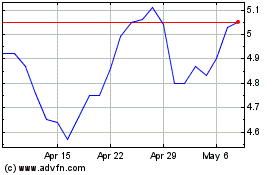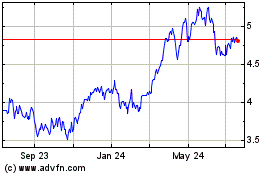By Jeannette Neumann
MADRID-- Banco Santander SA, one of the world's largest retail
banks, has for years relied on its profitable U.K. unit to offset
turbulence on other fronts.
Now, the Brexit vote has plunged Santander's U.K. cash cow into
uncertainty, leaving the bank facing headwinds in most of its main
markets.
Santander, which has units throughout Latin America, is
accustomed to coping with currency volatility, precarious economic
outlooks and rapid-fire political resignations. But such turmoil is
hitting the normally stable U.K., which generates around
one-quarter of Santander's profit. The British currency has been
pounded and the economy is expected to slow after voters supported
a U.K. exit from the European Union.
Analysts have cut their expectations for the bank's future
earnings. As a retail bank rather than an investment bank,
Santander has the advantage of being less exposed to major revenue
volatility when the market flops. But as a retail bank, analysts
note, it is exposed to the risk of Brexit-triggered slowdowns in
economies where it operates.
"The worse things go in the U.K., the worse it will be for
Santander -- that's just inevitable," said Daragh Quinn, an analyst
at Keefe, Bruyette & Woods in Madrid.
After Brexit, Mr. Quinn cut his estimates for Santander's
earnings per share, a profitability measure, by 12% for the next
two years.
A sustained decline in the pound would decrease Santander's U.K.
earnings when the bank reports them in euros. And the economic
slowdown that many expect in Britain is likely to hit the revenue
the bank makes selling mortgages and other products.
Analysts are also worried that the post-Brexit uncertainty will
force central bankers in Britain and the eurozone to keep their
interest rates lower for longer, which squeezes the profit
Santander and other lenders make on loans.
It isn't Brexit alone that has investors concerned about
Executive Chairman Ana Botín's ability to boost profitability and
the bank's share price.
She is scrambling to put out fires in several of the lender's
most important markets at the same time, a testament to the
challenges banks are facing world-wide. Santander is staring down a
prolonged economic recession in Brazil; continued regulatory
failings in the U.S.; and stubbornly sluggish loan growth and
negative interest rates in its home market of Spain. Now, the
repercussions of Brexit could put more of a damper on revenue
growth in Spain.
Santander shares have fallen about 16% since voter support for
Brexit was announced on Friday, June 24, frustrating Ms. Botín's
nearly two-year bid to boost the bank's stock price.
Ms. Botín led the bank's U.K. unit before she took the helm of
Santander when her father, the previous chairman, Emilio Botín,
died in 2014. Since then, Santander's market value has declined by
about half to around EUR50 billion ($55 billion).
Despite the hurdles to heightened profitability, Santander stood
by its financial targets three days after the Brexit vote, assuring
investors that it would be able to report a capital ratio of more
than 11% by December 2018 under international regulations known as
"fully loaded" Basel III criteria, up from 10.27% as of March 31,
and said that earnings per share this year will be above those of
last year.
"All commercial and financial targets for this year are
reiterated," Santander said in a regulatory filing.
Several bankers and analysts in Madrid said they were surprised
by the specificity of the announcement, given how uncertain the
fallout from Brexit is on the U.K.'s currency and economy, and on
other countries in the bloc.
Santander's chief financial officer says the bank's presence in
ten main markets helps to stabilize earnings.
"Competitive conditions in the developed countries are very
tough," finance chief José García Cantera said in an interview on
Friday. "But we are compensating that by a good, or even a
better-than-expected performance in emerging markets," he added,
citing Brazil and Mexico.
Some analysts have pointed out that the contraction in Brazil's
economy in the first quarter was less severe than expected and that
political turmoil has eased somewhat. Still, Brazil's economy is in
its fifth consecutive quarter of decline, the country's worst
recession in recent history.
Sofie Peterzens, an analyst at J.P. Morgan Chase & Co.,
points out that Santander's focus on cost cutting, particularly in
Spain where the bank is closing branches and laying off staff, will
"help drive profitability."
The bank is also facing regulatory hurdles in the U.S.
Santander last month failed the Federal Reserve's annual stress
test for a third year in a row, the only bank ever to do that,
because of weaknesses in "internal controls, governance, and
oversight functions" as well as problems measuring and monitoring
risk, the Fed said.
An annual report published by Santander's U.S. consumer-loan
unit at the end of March -- before the stress-test results were
announced -- shows the bank has a lot of work to do to ensure it
doesn't fail again next year.
The company said in the filing that its "CEO and CFO have
concluded that as of December 31, 2015, we did not maintain
effective disclosure controls and procedures," citing problems with
how it estimates provisions for loan losses; ineffective oversight
of the inputs and assumptions used in its models and a badly
managed hiring process that left the company with poorly trained
and ill-experienced financial staff.
"We are currently working to develop plans to remediate the
material weaknesses," the company added in the March 31 filing.
Write to Jeannette Neumann at jeannette.neumann@wsj.com
(END) Dow Jones Newswires
July 11, 2016 17:13 ET (21:13 GMT)
Copyright (c) 2016 Dow Jones & Company, Inc.
Banco Santander (NYSE:SAN)
Historical Stock Chart
From Mar 2024 to Apr 2024

Banco Santander (NYSE:SAN)
Historical Stock Chart
From Apr 2023 to Apr 2024
